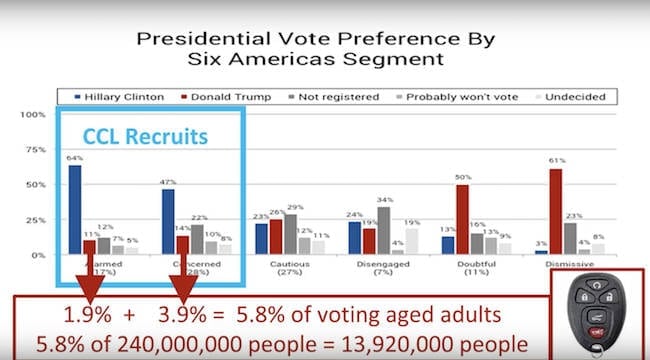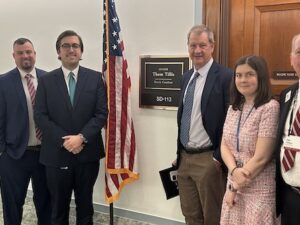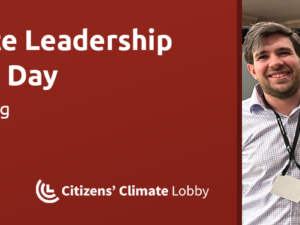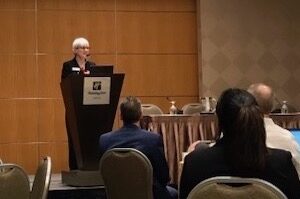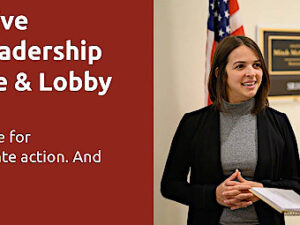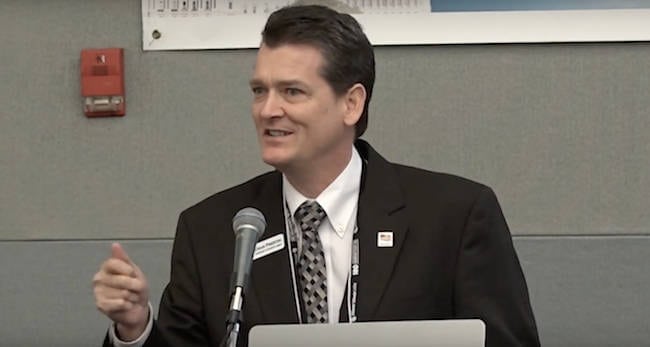
Craig Preston, California Coordinator for CCL Conservative Caucus
By Elizabeth Fenner
In CCL, our volunteers are constantly invited to find connections with people who have diverse political perspectives. At the recent Southern California Regional Conference, Craig Preston led a presentation focused on reaching across the aisle. As the California Coordinator of the Conservative Caucus, Craig was able to reveal some unexpected data and techniques for connecting with previously little-acknowledged allies. Watch his talk below, or keep reading for a recap of his message and techniques for connecting with conservatives.
Within CCL we have different political leanings, and while our membership includes liberals, conservatives, and moderates, CCL’s commitment to non-partisan policy brings us together. CCLers can be described as passionately non-partisan, radically moderate, and powerfully mild-mannered. And that’s good—we at CCL thrive on finding common ground.
But CCLers individually tend to be liberal. A 2016 survey revealed that within current CCL membership, 88% lean to the left, 7% to the right, and 5% identify in other categories. The US population tends to be differently balanced: 25% liberal, 36% conservative, and 34% independent.
Welcoming more climate-conscious conservatives
Just as long-term progress needs diverse perspectives and wide investment, CCL membership needs diversity to pass climate policy. In short, we want to bring more right-leaning climate-conscious people into CCL. The Conservative Caucus—representing conservative CCLers nationally—welcomes Republicans, Libertarians, and Independents who lean fiscally conservative. In California, CCLers left of center are welcomed to join the CA Friends of the Conservative Caucus.
Jim Tolbert, CCL Conservative Outreach Director, has led outreach to the Conservative Political Action Conference for the past two years, working to reach conservatives who are concerned about climate change. We know they’re out there, thanks to public opinion data from the Yale Program on Climate Change Communication.
This graph shows that political parties and their attitudes toward climate change can be grouped into “six Americas.” We often focus on the right side of the graph and are discouraged by the number of Republicans who are doubtful or dismissive of the issue. But look at the Republicans on the other side of the graph: among those self-identified as Trump voters, 11% and 14% considered themselves “alarmed” or “concerned” about climate change.
What kind of actual numbers are we talking about? Those alarmed or concerned Trump voters represent 5.8% of voting-aged adults, or 13,920,000 voters. That’s nearly 14 million Trump voters, many of whom are likely Republicans or conservatives, who are concerned or alarmed about climate.
It bears repeating: Almost 14 million right-leaning voters are concerned or alarmed about climate change.
If these Americans can feel understood—and know that their concerns are reflected in a policy that also supports their values—they are more likely to become active and involved in seeking productive solutions regarding our climate. They might even join our ranks.
How do we find them?
CCL’s Conservative Caucus makes efforts to meet conservatives where they are—literally. Tabling at marches, climate conventions, and even farmers’ markets often attracts more folks left of center, so the Conservative Caucus instead branches out in other directions.
The Conservative Caucus has had success tabling and attending meetings at GOP conventions, the National Federation of Republican Women, and local Republican Party clubs. They’ve found receptive, engaged audiences with conservative youth across the country, such as the Young Americans for Liberty, Young Republicans and College Republicans. The Conservative Caucus also sees promise with organizations that include all political types and share values regarding nature and climate, such as the National Audubon Society, Ducks Unlimited, and Trout Unlimited—who even had a climate-focused breakout session at their recent national conference. Rotary Clubs, Kiwanis and local outdoor groups are other avenues to connect with conservatives.
For more ideas and tips on how to make contact with these groups, the Conservative Recruitment Toolkit is available to help.
Not everyone feels comfortable visiting conservative groups, but many chapters will have a bold member willing to reach out and start these conversations.
What can your chapter do?
- Learn more about this population. The following videos are helpful, which can be found on CCL Community: The Moral Roots of Liberals and Conservatives, How to Have Better Political Conversations, Conservative Messaging Theory, and the Conservative Messaging Workshop.
- Develop a local conservative outreach team, which can help find and build relationships with right-leaning groups.
- Hold events designed for conservative-leaning audiences such as veterans. Films such as “Tidewater” and “The Burden” share a conservative viewpoint of the effects of climate change, especially related to the homeland security and the US military.
- Have your chapter recruit schedulers to ask for speaking opportunities with conservative groups.
Craig Preston’s presentation at the SoCal Regional Conference was inspiring and motivating in that it showed us a population of conservative Americans (a large voting population!) who not only acknowledge climate change but are hungry for solutions. This population is not hiding; conservatives concerned with climate are all around us and perhaps are just waiting to be engaged in the conversation.
The Conservative Caucus is here, is growing, and it offers resources and support as you personally “reach across the aisle” in your community. As we ask Congress to work together, let’s also show them how it’s done.
Elizabeth Fenner is an environmental activist, college English instructor, and founder and co-leader of the Los Angeles Mid-City CCL chapter. She led the team that put on CCL’s 2016 SoCal Regional Conference and is a new member of CCL’s Conservative Caucus.
Learn More:

